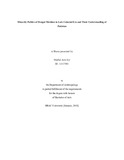| dc.contributor.advisor | Huq, Samia | |
| dc.contributor.author | Joy, Shafiul Aziz | |
| dc.date.accessioned | 2018-07-05T10:26:16Z | |
| dc.date.available | 2018-07-05T10:26:16Z | |
| dc.date.copyright | 2018 | |
| dc.date.issued | 2018-01 | |
| dc.identifier.other | ID 13317001 | |
| dc.identifier.uri | http://hdl.handle.net/10361/10311 | |
| dc.description | This thesis is submitted in partial fulfilment of the requirements for the degree of Bachelor of Social Science in Anthropology, 2018. | en_US |
| dc.description | Cataloged from PDF version of thesis. | |
| dc.description | Includes bibliographical references (page 46-48). | |
| dc.description.abstract | This thesis reviews how the idea of Pakistan was accepted and explicated by the Bengali Muslims in late colonial era. The question of cultural autonomy was resolved by them based on linguistic, cultural and religious aspects in this period focusing on formation of Muslim identity. Amid the tension of unified and divided India, partition was seen as a political agenda to address the matter of self-determination for a larger of part Bengal Muslims. Both the Muslim League and the Congress postulated the idea of identity separately and claimed their notion as grounded on non-sectarian policy in terms of their expediency. For Muslim League, a group of young writer, journalist, and politicians named East Pakistan Renaissance Society emerged to defend the idea of Pakistan as a minority problem with their intellectual and historical understanding. Abul Mansur Ahmed was one of the central characters of this organization, though he joined the organization in later phase. Conceptualizing the idea of minority in socio-political and cultural frame clearly split the respective notions of identity by Congress and League. Nationalistic history has often imputed EPRS and its associates as communal in ideology. This paper tends to show East Pakistan Renaissance Society’s idea embedded on distinction of religion, language and culture was a step towards secular state. These ideas of identity associating religion, culture and language were addressed and resolved through the notion of Muslim as a minority in undivided colonial period. Thus, formulating the concept of minority politics basically paved ways to address identity conflict based on language, religion and culture. This paper seeks to understand the parameters of secular politics and notions of identity proposed by the Congress and the East Pakistan Muslim League’s supporting organization EPRS and how their ideological differences were emerged based on addressing minority as a political form. | en_US |
| dc.description.statementofresponsibility | Shafiul Aziz Joy | |
| dc.format.extent | 48 pages | |
| dc.language.iso | en | en_US |
| dc.publisher | BRAC Univeristy | en_US |
| dc.rights | BRAC University theses are protected by copyright. They may be viewed from this source for any purpose, but reproduction or distribution in any format is prohibited without written permission. | |
| dc.subject | Minority | en_US |
| dc.subject | Bengal muslim | en_US |
| dc.subject | Pakistan | en_US |
| dc.title | Minority politics of Bengal muslims in late colonial era and their understanding of Pakistan | en_US |
| dc.type | Thesis | en_US |
| dc.contributor.department | Department of Economics and Social Sciences, BRAC University | |
| dc.description.degree | BSS in Anthropology | |

